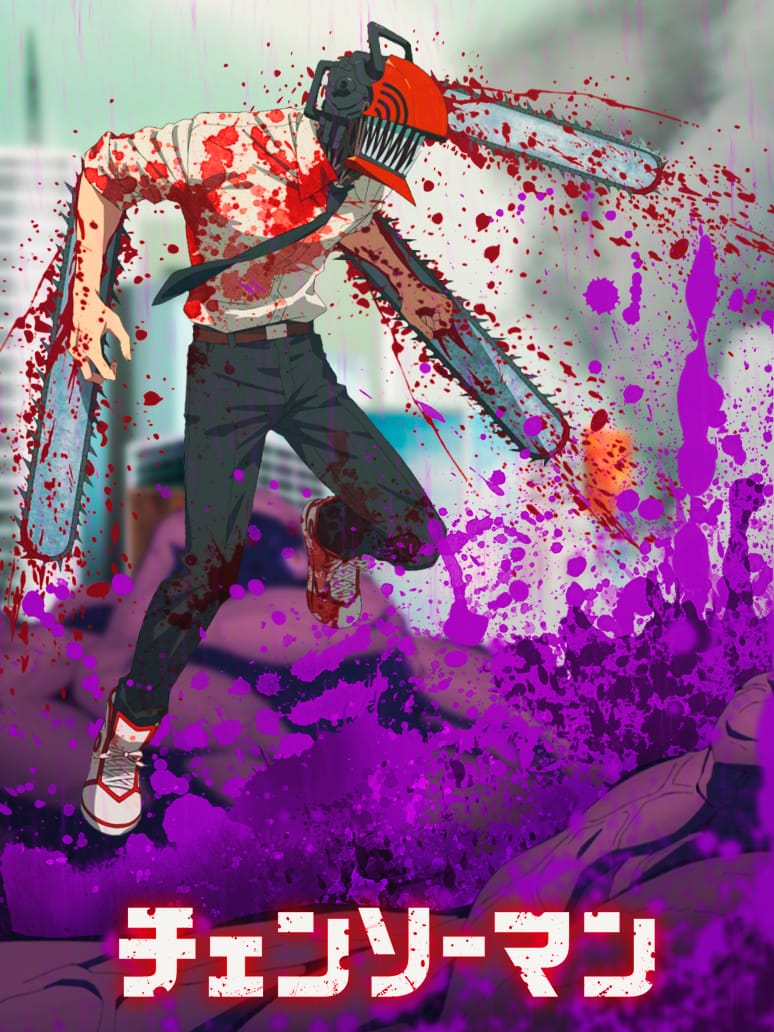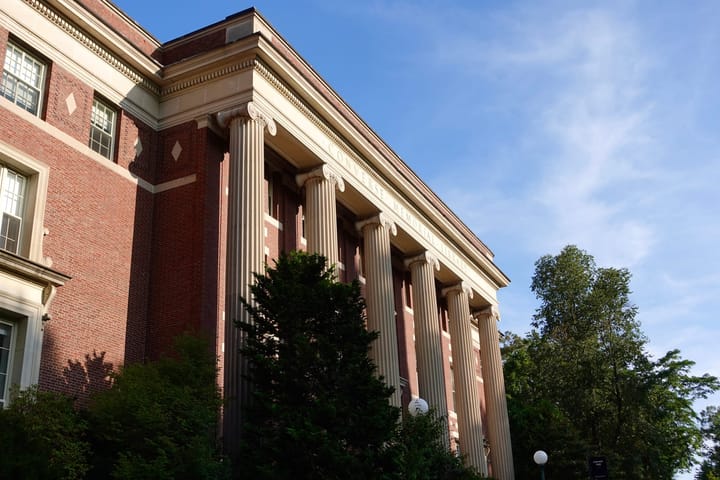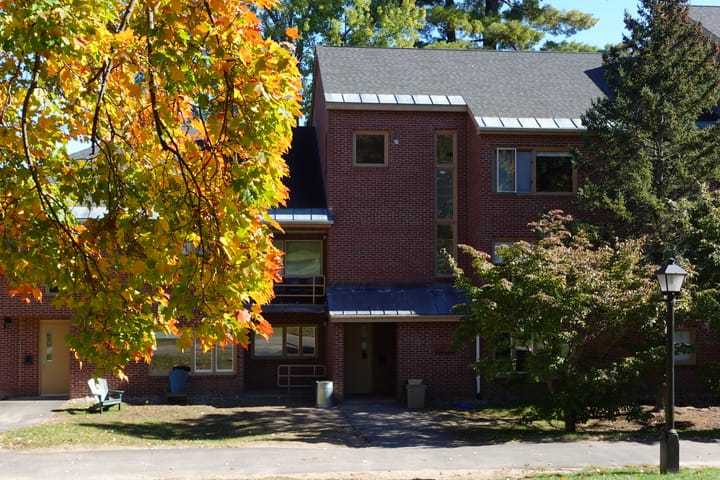“Chainsaw Man — The Movie: Reze Arc” Review
Contributing Writer Alden Parker ’26 shares his emotional journey from freshman wonder to senior reflection in his review of “Chainsaw Man: Reze Arc.” Experience the nostalgia and insight that show how time, growth, and fandom transform the way we connect with the stories we once loved.

It’s a Friday night in October 2022. I’m a bright-eyed and bushy-tailed freshman, a month into my Amherst College experience. As with almost all my recent Friday nights, I’m sitting in a lecture hall at the Beneski Museum of Natural History, attending the weekly meeting of the Anime Club. I’ve joined this club both to make friends and to further explore the world of anime and manga, which I’ve only just started to investigate on my own after graduating high school. For this week’s screening, the club president offers to showcase a hotly anticipated new series that recently premiered in Japan — something titled “Chainsaw Man.” The lights go out, and the episode plays … and over the following weeks in the club, through this series’ delirious mix of vibrant motion and sound, I feel my interest blossoming into something much, much stronger.
It’s a Friday night in October 2025. I’m a (slightly) more world-weary senior, a month into my final year at Amherst. In the intervening years, I’ve joined and supported the Anime Club’s executive board, directed my cultural interest in Japan toward learning the language, spent four months studying abroad in Kyoto, and collected many more volumes of manga than I can immediately count. I am not sitting in a lecture hall tonight, but instead in a large movie theater, waiting to see “Chainsaw Man — The Movie: Reze Arc,” the long-awaited continuation of the story that so captivated me three years ago. The lights go out, and the film begins … and over the next two hours, I feel something different from before.
Adapted from Tatsuki Fujimoto’s envelope-pushing humans-versus-devils manga, “Chainsaw Man: Reze Arc” picks up immediately where the TV series left off, with barely any preamble: The very first scene depicts the titular hero, the transforming half-devil vagrant-turned-government-lapdog Denji (voiced by Kikunosuke Toya), waking up to the mess of the previous night’s celebratory dinner, as shown over the credits of the final episode. The film’s quick jump back into the story, coupled with a surrealistic title sequence evocative of the original series’ own (down to the incorporation of a new Kenshi Yonezu theme song), seems tailored to reassure fans who have lapsed over the three years spent waiting: This is still “Chainsaw Man” as you remember it. Nothing has changed.
Denji’s personal status quo, however, is in for a major shakeup: In his patrols as a “devil hunter” for Japan’s Public Safety department, he encounters the café waitress Reze (Reina Ueda), who charms Denji with her genuine interest in his life and well-being, unlike almost anyone he’s met before. The pair’s blossoming relationship naturally extends the TV series’ underlying premise of Denji’s efforts to live the good life that has always been denied him, as Reze forces him to question whether even his present life as Public Safety’s secret weapon is “good enough.” Of course, since the mysteriously coveted power of Chainsaw Man is part of the equation, this relationship is ultimately set to blow up in Denji’s face, as Reze proves to be not all that she seems …
Stylistically, “Reze Arc” continues the alternation between quiet character drama and super-stylized action that defined the “Chainsaw Man” TV series, with the film devoting roughly half the runtime to each. The first half goes to great efforts to evoke cinematic “realism” in its shot composition, with careful attention to evoking natural light in the animation. Coupled with a largely mellow ambient score, it wouldn’t be hard to imagine many of these scenes, especially Denji and Reze’s nighttime makeout in an empty school’s rooftop pool, appearing in an independent coming-of-age drama. The second half, meanwhile, uses the narrative’s swerve into an extended chase/battle sequence as a pretext to really cut loose, exhibiting a hyperkinetic animation style with occasional explosions of unrealistic color, and much harsher, adrenaline-fueled electronic beats in the score. I found myself more engaged by the latter half, no doubt due to my strong memories of the TV series’ highlight wild action scenes, but at times, the speed and spectacle caused me to lose track of the action’s flow. Compared to this year’s earlier anime blockbuster “Demon Slayer: Kimetsu no Yaiba — Infinity Castle,” “Reze Arc” similarly prioritizes dynamic action, but is more willing to sacrifice coherence for style — much like its parent manga.
There are a few gripes I have, mostly related to how much of the world of “Chainsaw Man” can be shown in the scope of the film. I personally miss Fairouz Ai’s bombastic performance from the TV series as Power — Denji’s comically egomaniacal devil work partner — since the character gets sidelined to put a laser focus on the Denji-Reze dynamic; at the very least, her in-story replacement Beam (Natsuki Hanae) provides some levity by going in the opposite direction with his slavish devotion to Chainsaw Man. The subplot surrounding Denji’s former mentor Aki (Shogo Sakata) and his new partner Angel (Maaya Uchida), having been only just introduced in this portion of the story, also feels incomplete without the full payoff that I know comes later in the manga, leaving me unable to reinvest interest in either character after so much time apart.
More than anything, though, I feel my discontent with “Chainsaw Man — The Movie: Reze Arc” is rooted in the passage of time. I have been reading the “Chainsaw Man” manga for most of the years since I watched the TV series, and have seen the narrative grow more and more ridiculous and, perhaps, slightly nihilistic with each new chapter as Fujimoto slowly walks toward its still-unknown ending. I have read and watched more manga and anime in those years that have made me think and feel things that “Chainsaw Man” didn’t, things I now know I want to keep thinking and feeling more. I now have a broader understanding of Japan, historically and culturally, from my studies at Amherst and my experience living there, than I did as a freshman, with this story as one of my only points of reference. “Chainsaw Man,” the anime, may not have changed, but I have. I may continue to read the manga out of fondness for what this story and world introduced to me, and to see how it finally ends, but if it takes another three years for the story to continue on the screen, I won’t be holding my breath.





Comments ()